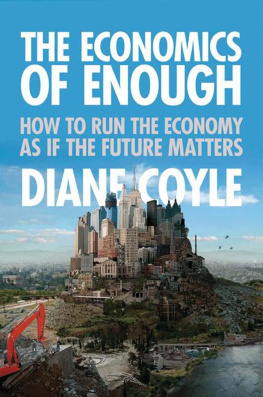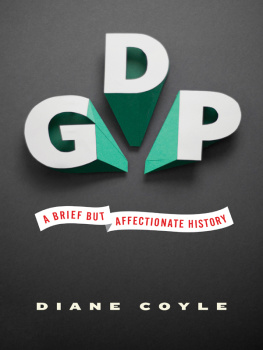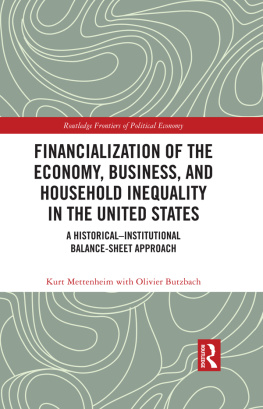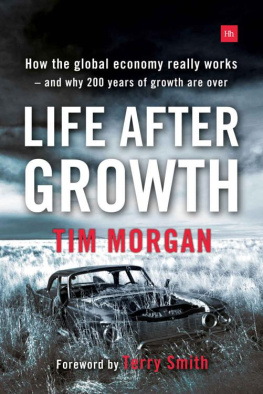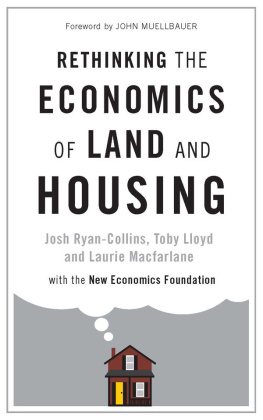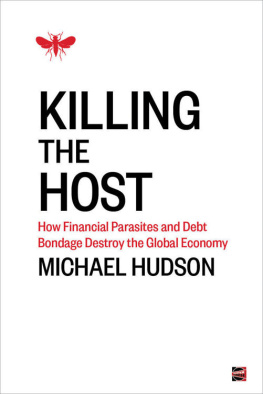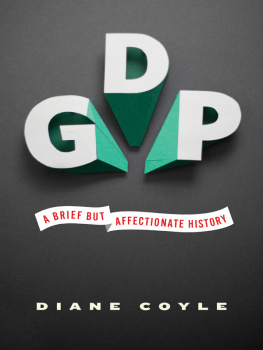The Economics of Enough
THE ECONOMICS
OF ENOUGH
HOW TO RUN THE
ECONOMY AS IF THE
FUTURE MATTERS
DIANE COYLE
PRINCETON UNIVERSITY PRESS PRINCETON AND OXFORD
Copyright 2011 by Diane Coyle
Requests for permission to reproduce material from this work should be sent to Permissions, Princeton University Press
Published by Princeton University Press, 41 William Street, Princeton, New Jersey 08540
In the United Kingdom: Princeton University Press, 6 Oxford Street, Woodstock, Oxfordshire OX20 1TW
press.princeton.edu
Jacket art: Julee Holcombe, Babel Revisited, copyright 2004.
All Rights Reserved
Library of Congress Cataloging-in-Publication Data
Coyle, Diane.
The economics of enough : how to run the economy as if the future matters / Diane Coyle.
p. cm.
Includes bibliographical references and index.
ISBN 978-0-691-14518-1 (hardcover : alk. paper)
1. Economic policy. 2. Values. 3. Happiness. I. Title.
HD87.C69 2011
330dc22 2010041654
British Library Cataloging-in-Publication Data is available
This book has been composed in Sabon and Futura
Printed on acid-free paper.
Printed in the United States of America
10 9 8 7 6 5 4 3 2 1
CONTENTS
The Economics of Enough
OVERVIEW
In mid-september 2007 my sister phoned me to ask whether she should withdraw her savings from the bank and put the money somewhere elseand if so, where would be safe. She was with Northern Rock, and there was an old-fashioned run on the bank. It was unable to meet customers demand for withdrawals and had to ask the Bank of England to lend it the cash. The television news showed lines of anxious depositors hoping to take out all their funds. It was the first full-fledged bank run in living memory in the United Kingdom. I told her that the government would bail out all the depositors, as it would be political suicide to do anything else. My sister ignored my advice (although it ultimately turned out to be right) and joined the line outside her local branch. As for Northern Rock, it had to be taken over by the British government.
A year later, in September 2008, the investment bank Lehman Brothers collapsed. Within a day or two, as financial markets around the world plunged, it was clear that this bankruptcy threatened to bring down the entire global financial system like a house of cards. The banks didnt know if they would get repaid for transactions they had engaged in, which through a massively complex series of links, might end up at Lehmans. They stopped trusting each other, literally overnight. The interbank market, the engine room of the financial system, came to a halt. For a whole week, I went to the cash machine and withdrew my daily limit. It seemed entirely possible that if the interbank market had stopped working, so might the clearing and settlements systems between banks which make possible everyday payments with credit and debit cards or checks. Going to the store, ordering online, paying bills would have become impossible. Companies wouldnt have been able to pay each other for goods they ordered. Salaries would not have come through into peoples bank accounts. The economy would have ground to a halt. A year later, the Bank of England confirmed that this catastrophe had been horrifically close. The financial system is the pinnacle of the trust on which all economies and all societies have to operateand that trust almost evaporated.
This is not a book about the financial crisis. But that crisis has proven a catalyst for many people to ask fundamental questions about the way the economy is organized, and about the links between the economy and the kind of society wed like. The Economics of Enough looks at this wider question, or rather set of questions. It is about how to ensure that government policy and the actions of individuals and private businesses serve all of us better in the long term, and how to make sure what we achieve in the present doesnt come at the expense of the future. Its about how to run the economy as if the future matters.
This certainly hasnt been the case for at least a generation. Western economies face a staggering set of problems, all politically difficult to tackle. We face them in the context, too, of global uncertaintyof an unstable world where the balance of power is shifting and in every direction there seem to be new threats. At present we lack the analysis and the institutions needed for addressing the seemingly intractable economic and social challenges, and even more fundamentally the political framework for debating what to do. While majorities in many countries report in opinion polls that they dont trust politicians and establishment institutions, there is no obvious political process or vision that will allow us to reach a democratic agreement about what to do. Politics seems to either reduce to questions of managerial competencewhich party or leader will be most efficient?or to bitter partisanshipwhere each party attacks the other regardless of practical matters. So I also address the politics of Enough, the kind of debate well have to hold about the economic challenges and how to respond to them.
This is in some ways even more urgent than the economic issues, because past experience in times of great change and uncertainty suggests that irrational and violent responses can hold sway if everyday politics do not seem to offer a path out of current difficulties. The economic parallels between the post-crisis downturn and the Great Depression are not encouraging if theyre an indicator of political parallels too. It has become a truism to say that the old left-right division in politics has become outdated. Im not sure thats wholly true, but it is certainly the case that neither left nor right has a clear map of the new political terrain. However, by the end of this book some of the profound political choices ahead of us will be a bit clearer.
T HE E CONOMIC C HALLENGES
Although, as I write, there are tentative (and perhaps temporary) signs that a recovery is under way, the banking system is still being propped up by massive government help schemes and partial state ownership. Indeed the financial crisis might have further to go, depending for instance on whether European governments such as Greece can repay their debts, or how high unemployment stays and for how long. To say the economy is in a mess is an understatement. Any recession is unwelcome because people lose their jobs, and this has been no ordinary recession. The banking crisis made it the deepest since the Great Depression. The recovery will be a long, slow haul, and there will be a legacy of spending cuts, tax increases, and a huge government debt burden in many countries. The debate about public spending is not whether it will have to be cut, but rather how much and how quickly. It is hard to see where jobs will come from for the next few years.
Financial crises have happened frequently throughout the history of capitalism. Many are relatively brief and small in scale, but a few do go down in the history books as major catastrophes, from the South Sea Bubble to the Great Crash of 1929, to our own recent experience.to crises, and to boom and bust. Market economies are unstable. The price of increasing prosperity is uncertainty about what the future holds. But even though the financial crisis has prompted many people to revisit this longstanding issue of instability, there are many other deep problems facing all the worlds richest economies at present.
For, as if the fallout from the financial crisis were not enough, the developed world has a rapidly aging population, people whose pensions and health care will also add to the financial burden on those in employment. The proportion of the population still working is declining in many countries. Regardless of the specific financial structure, and whether or not pensions and health care are privately or publicly funded, all the people not working at any one time need to be supported by the efforts of those who are working. In every OECD country the aging of the population will inexorably increase government spending because state support of the elderly through one route or another is universal, whether it takes the form of pensions, subsidized health care, or other forms of social care. The generation of people who fought in the Second World War were rightly rewarded for their sacrifices, and these rewards included many publicly provided services. Their children, the baby boom generation, extended those pension and health schemes and are benefiting on a huge scale from them now, as they pass through the age structure of the population like a mouse through a snake. The benefits they are enjoying are being paid for by mounting government debt, some of it acknowledged, but much of it simply implicit in the promises of what services the government will pay for. Those promises will almost certainly be broken.
Next page
